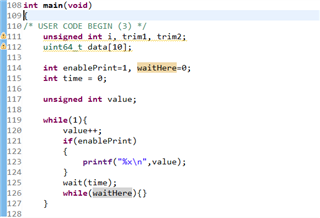Other Parts Discussed in Thread: SEGGER,
I'm using SEGGER's JLink Pro to debug TMS570LS1227. It's really convenient to have the printf function (provided by run time library rtsv7R4_T_be_v3D16_eabi.lib), which prints message through the debugger to the console in CCS.
But the chip seems not to function well when using printf. The peripheral dependent on TMS570's ECLK pin gives wrong output. The ecap module of TMS570 behaves oddly too. Disabling printf solves the problem. But I still need the chip to print messages when running. So how does printing to debugger affect the chip's behavior? And is there a way to cancel the effect?


